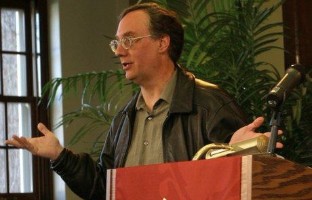Obama and the Arab Spring: Historian Juan Cole

Juan Cole is a professor of history at the University of Michigan, former editor of the International Journal of Middle East Studies and author of numerous articles on the politics, culture, religion and poetry of the Middle East. After September 11, 2001, he started a blog called "Informed Comment" that draws on Arab-language media to present a wide range of analyses. His books include Napoleon's Egypt: Invading the Middle East and Engaging the Muslim World.
How would you grade President Obama on Middle East policy?
Because of Obama's policy of getting out of Iraq and his clear respect for the culture and politics of the region, he is still personally popular in the Arab world. The U.S. favorability rating in Egypt, for example, has gone from 2 percent to 40 percent in the past two years. This was before the Arab Spring, so I suspect it is even higher now.
Read our latest issue or browse back issues.
His attempts to restart peace negotiations between Israel and Palestine have crashed and failed, but I give him an A for effort. He faced a situation in which no one would have been able to have much success.
On Iran, Obama has had the right instincts, but he has gotten his hand slapped away. He has not rattled sabers the way his predecessors did, and he has moved on to financial sanctions as a way of restraining Iran.
As for his Afghanistan policies, I really disagree with them. He has escalated the Afghanistan war and has adopted a plan that may have been forced on him by the Pentagon, but it is way too ambitious and very unlikely to succeed.
How significant is Osama bin Laden's death?
Bin Laden's death is largely irrelevant to Middle East politics. The Pew opinion polling of six Middle Eastern countries showed, for example, that even before his death the number of Lebanon's Muslims who said they trusted bin Laden to do the right thing was only 1 percent. In Jordan the figure was higher—13 percent. But there are no political parties contesting elections anywhere in the Middle East with anything like bin Laden's ideological program. To some degree, the West has always exaggerated bin Laden's importance.
What do you think of Obama's response to the Arab Spring?
The Arab Spring put him in a very difficult position. Initially, this was a popular movement against authoritarian U.S. allies. As a world power, you don't want to lose your allies. As a democratic world power, you don't want to be opposed to democratizing. So Obama was between a rock and a hard place. He was slow to recognize the power of the popular movement, as almost everybody was. But slow though he was, he came around to the right positions. If Obama had given just one week earlier the speech that he gave after Egypt's Mubarak fell, it would have been a historic speech. He gave Mubarak the nudge when the time came.
Did Obama do the right thing in using American air power in Libya?
Obama did the right thing in acquiescing to the British and French demand that Qaddafi not be allowed to crush his people. Two values were in conflict. Most Americans would like to see people take care of their own business. They appreciate noninterventionism. On the other hand, most Americans don't like to see tanks crush unarmed crowds. This is more than a humanitarian impulse; it is an impulse to do what is right politically and support democratic movement.
I share both impulses, but sometimes you have to make a choice. In the end, I choose the people of Benghazi and the others who are yearning for their freedom. It would have been horrible if Qaddafi had been allowed to crush them. Once a movement is crushed, it is hard to get it back.
If you could dictate U.S. foreign policy in these regions, what would be your top priorities?
The U.S. needs to stop obsessing about Israel and Saudi Arabia and start caring about the institutions, laws and practices that shape the lives of 300 million people in the region who are now moving toward ideals and systems of government that are much more compatible with our own.
The U.S. should be delighted about what is happening in places like Tunisia and Egypt and should be training judges and electoral observers like mad. There should suddenly be lots of money from the U.S. for practical training for democracy promotion. We should be supporting human rights NGOs and media watchdog groups to establish free and fair media in these places. Tunisia has abolished its censorship apparatus. This is an incredible opportunity—to have an Arab country with no censorship. We can help them shape their law and policies.
Much of your background is in poetry and religion. How does that background influence your views?
Poetry is really important in Middle Eastern societies in a way that it isn't in the U.S. Most people there still express themselves in poetry. In the early days, Osama bin Laden sent messages to his followers in poetic form. In Pakistan, people write and share poetry all the time; poetry is much more democratic there than in the U.S., where it has become an elitist thing.
Just to give one example, a lot of Americans would be inclined to think of Pakistan as a fundamentalist Muslim society. Of course, there are fundamentalists in Pakistan. But the vast majority of Pakistanis adhere to Sufism, the mystical dimension of Islam, and Pakistanis are enthralled by mystical poetry. I recently listened to some of this poetry put to music, and in the poem the mystic was saying that since God created creation, he thereby became the Creator. Having become the Creator, God can't keep that name without creation. He needs his creation. I cannot tell you how upset fundamentalists would be to hear this verse in Urdu, but it is from a very popular poet. People who don't attend to the poetic aspect of this religious culture get misled.







